The rule is if you don't know how to use your HEAVY HANDS, you are unfit to be superpower!
Dotard is STRUGGLING with heavy hands and very desperately.
But Stupid China is still too civilized and too kind.
It must not just use heavy hands on USA, but also the entire world! This way is to kill USA spectacularly and thoroughly.
If superpowers are not using heavy hands, than they are downgrading themselves to the same level as weak BAPOK PEE SAI ! This is a sucker's way!
If superpowers are not hurting the smaller Pee Sai or Gao Sai or Guu Sai - various sizes of poo... they are not superpower! They defeated and lost their functions and leadership position. Then world is a disarray bunch of HIGH EGO TINY LITTLE BASTARDS Arrogant and No-Big-No-Small, they don't know how fragile and weak and insignificant they are, and demand this and that and expecting their big mouth stupid ideas to be respected! Only when superpower deliver damages and destruction and deaths & unbearable losses to them with heavy penalties, they will learn about reality and know who they really are and learn how to behave.
If China does not use a HEAVY HAND TO TAKE USA DOWN & MAKE ALL THE REST shit & wet their pants, and felt the brute and shock & hurt, China won't be the real superpower, and the little bastards will think 1B1R is kind Santa Clause and can go blackmail Xijinping. Demanding FOC Beer.
Today, China has GLOBALLY UNIQUE POWER as the most COMPETITIVE & STRONGEST MANUFACTURER FAR EXCEEDING OTHERS. Without a constant supply of MADE IN CHINA GOODS, most countries espeially the bankrupted beggars die instantly and cock standing. They cannot make MOST OF these products, and cannot even find AFFORDABLE ALTERNATIVE within short time before they are fucking dead. China has this power that is globally unmatched.
Everyone can see that Dotard-land is drowning and struggling very desperately. China can use HEAVY HAND TO DROWN Dotard-land FAST and stop it from further struggling. Most countries can survive the pains from lack of USA. Without USA, they sustain heavy hurts, but will not die. Without China most countries die instantly, even USA is so.
So the Trade War game must be such that China must force EVERYONE TO TAKE SIDE WITHOUT MERCY NOR EXCEPTION. Forced by ultra heavy TARIFFS ON BOTH IMPORT & EXPORT. Any countries which chose to continue to trade with Dotard-land will face a 1000% Tariff for example, on ANY DEALS with China. @$10 per Dollar, and increased up to e.g. 50000% if you further continued.
Yes! You little bastards all smart? Don't want to choose sides? huh? I will teach you painfully to choose. Now you know who is boss yet? You don't? I will make you FEEL IT up your ass!
https://www.malaysiakini.com/news/478505
M'sia doesn't want to choose between US and China - Liew
Published: 3 Jun 2019, 11:41 pm | Modified: 3 Jun 2019, 11:41 pm
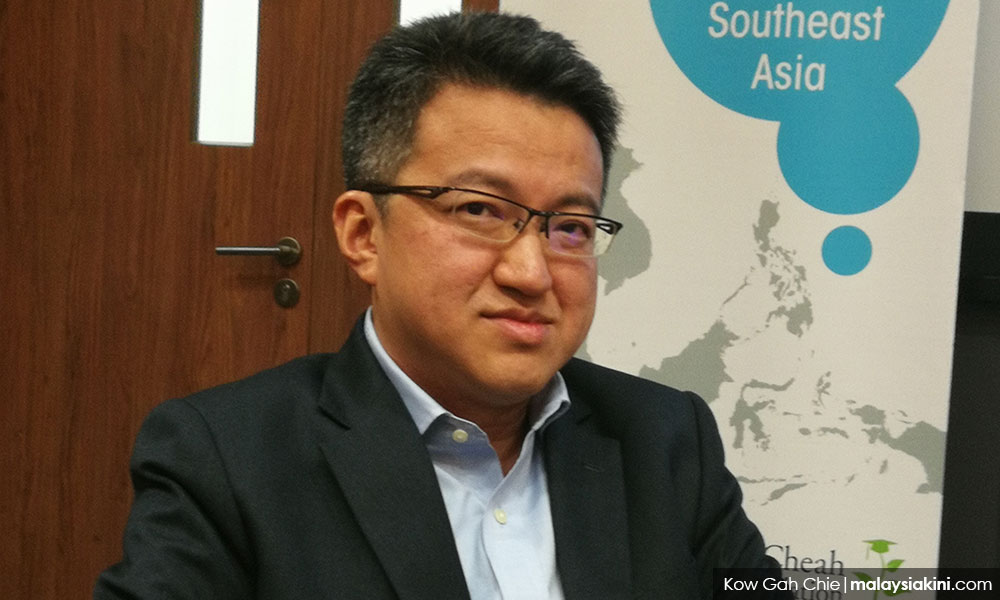
Amid the trade war between China and the US, Deputy Defence Minister Liew Chin Tong said Malaysia does not want to be forced to pick sides between the two superpowers.
He said a situation where a country must take sides between the US and China would rob other countries of their agency.
“We are very clear that we do not want to choose between the two great powers. We want to form constructive relationships with the two great powers and also other ‘middle powers’.
“If we only see this in the perspective of China and the US, then there is no agency for anyone else, and I think what we are trying to do both in Malaysia and Singapore is to construct an alternative way.
“That is to tell both of them that we have our agency, we’re here to stay, and we’re here to work with both of them,” he said in an interview aired by the US broadcaster CNBC today.
The US and China have been engaged in a tit-for-tat that entailed raising tariffs on each other’s goods and the former blacklisting the Chinese telecommunications equipment manufacturer Huawei.
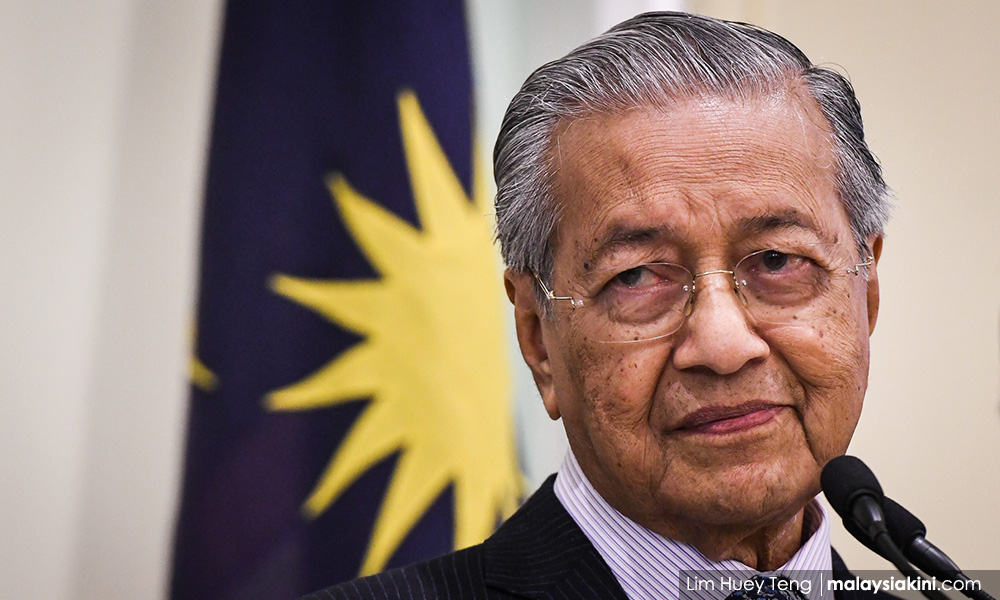
Prime Minister Dr Mahathir Mohamad (photo) had previously said Malaysia would favour the “rich” China over the “unpredictable” US if forced to take sides, but said this is a purely economic consideration.
Meanwhile, Liew conceded that it would be a challenge to work with both China and the US, but said the same also applies to all other countries.
He described 2019 as the end of a three-decade period that began with the fall of the Berlin Wall in 1989, and the new era would have new rules and a different balance of power.
“We have to accept that we are moving into a different period in which this different period has a different set of rules that we have to construct, we have to articulate, and with a different architecture, and a new power balance.
“That new period of time is one where the US will still be big, and the US will still be the single largest economy, the single largest military power.
“But at the same time, China is not small, and you have Russia, you have other middle powers like Japan, Australia, Indonesia, Turkey, Iran, and they will all have a say unlike the period of time starting from the fall of the Berlin Wall,” he said.
https://www.voanews.com/a/asia-maritime-diplomacy/4943242.html
S. China Sea
Asian Countries Fear Being Forced to Choose between China, US over Disputed Sea
June 03, 2019 5:47 AM
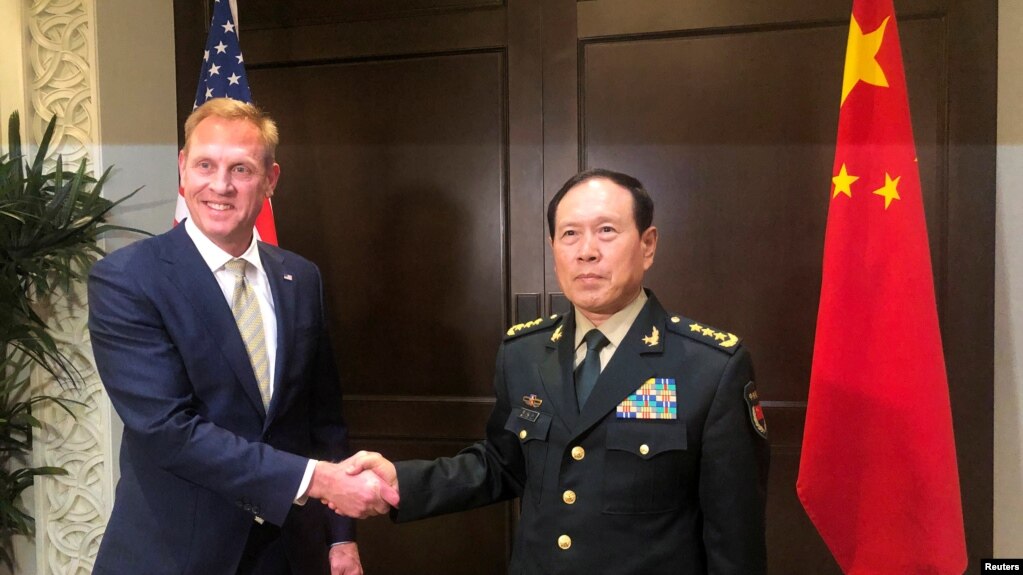
Acting U.S. Defense Secretary Patrick Shanahan and Chinese Defense Minister Wei Fenghe meet before the start of their meeting in Singapore on the sidelines of the Shangri-La dialogue, May 31, 2019.
Share
See comments
TAIPEI —
Asian countries that pride themselves on neutral foreign policies face growing pressure to support either China or the United States in a sticky maritime sovereignty dispute, but they are expected to bid for both and keep the aid coming in.
Southeast Asian claimants to the disputed South China Sea grappled with the prospect of choosing sides over the weekend at the annual Shangri-la Dialogue defense forum in Singapore. The question loomed so large that Singapore Prime Minister Lee Hsien Loong warned of smaller countries being “forced” to take sides.
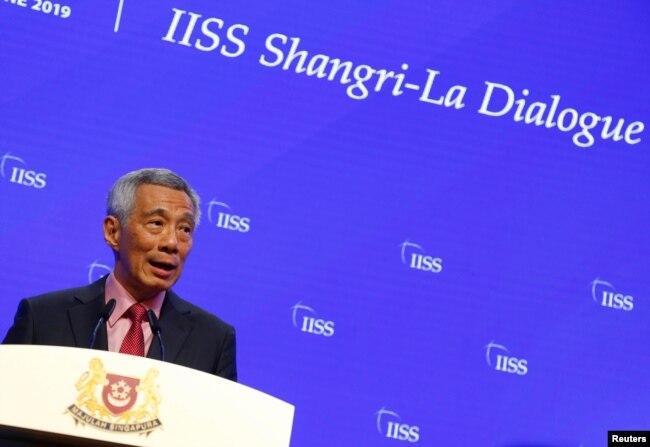
Singapore's Prime Minister Lee Hsien Loong delivers a keynote address at the IISS Shangri-la Dialogue in Singapore, May 31, 2019.
“This is probably going to lead to a situation that the Singapore prime minister called being forced to choose between two sides,” said Jay Batoncbacal, international maritime affairs professor at University of the Philippines. "So, that’s really the problem here if it continues to escalate.”
As the two superpowers disagree over control of the sea and each seeks external support, Asian countries may find it increasingly hard to count both as friends. To take the U.S. side risks economic punishment by China, while the United States might forego military support to an overt China backer.
China’s appeal
China wants other countries to accept economic boosts and bilateral talks to settle maritime sovereignty issues. Beijing has already pushed for joint undersea fuel exploration with Vietnam and the Philippines, two frontline South China Sea states. It has funded infrastructure in a third, Malaysia.
At the Shangri-la Dialogue, attended by more than 600 delegates from 40 countries, Chinese Defense Minister Wei Fenghe appealed for “mutual cooperation” and hoped that no one would “underestimate the wisdom and ability of regional countries to properly handle differences and maintain peace.”
Without naming the United States, Wei urged other countries to snub anyone who goes against those goals. The U.S. government does not claim the sea, but it has passed naval ships through it 11 times since 2017 and flown B-52 bombers over the waterway to check China.
China had alarmed much of Asia, particularly in Southeast Asia, by landfilling tiny islets in the sea for military use.
“In terms of the big picture, Wei Fenghe, last year he represented (Chinese President) Xi Jinping with a statement saying he wants to repair relations with neighbors,” said Huang Chung-ting, Chinese politics and military affairs assistant research fellow with the Institute for National Defense and Security Research in Taipei. “He hoped there wouldn’t be too many issues of excessive conflict.”
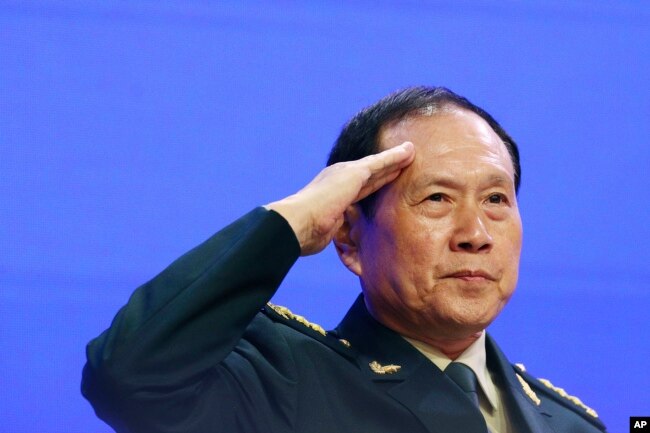
Chinese Defense Minister Gen. Wei Fenghe salutes attendees ahead of the fourth plenary session of the 18th International Institute for Strategic Studies Shangri-la Dialogue, an annual defense and security forum in Asia, in Singapore, June 2, 2019.
Countries that offend China at sea risk being expelled by Chinese coast guard ships or running up against its annual mid-year fishing bans, Huang said. China also has a record of boycotts and withdrawal economic support for countries – South Korea, for example -- that go against its views.
US to strengthen “network”
The United States extends joint military exercises and occasional arms sales in Southeast Asia to help the South China Sea remain open internationally despite 10 years of increasing control by China. China claims 90 percent of the sea, more than the Southeast Asian states, all of which are militarily weaker.
The United States is “strengthening” an “unrivaled network of alliances and partnerships” that includes joint naval exercises, U.S. acting defense Secretary Patrick Shanahan told the defense dialogue. He urged an “end” to Chinese “behavior.”
In May, the United States drilled alongside a French aircraft carrier, a Japanese helicopter carrier and two Australian vessels in the Indian Ocean. All participants have previously sent vessels to the South China Sea.
“No other nation can match the United States’ ability to work across distance, cultures, languages, and time – and we are increasing the rate at which we do this,” he said.
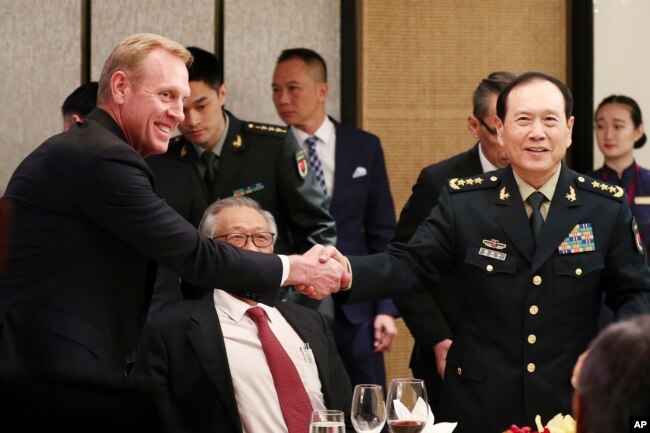
Acting U.S. Secretary of Defense Patrick Shanahan, left, shakes hands with Chinese Minister of National Defense Gen. Wei Fenghe on the sidelines of the 18th International Institute for Strategic Studies Shangri-la Dialogue, Singapore, June 1, 2019.
Complex foreign policies
Brunei, Malaysia, Taiwan, Vietnam and the Philippines all vie with China’s claims to the 3.5 million-square-kilometer South China Sea. They prize its fisheries and fossil fuel reserves.
Those countries plus Indonesia, which occasionally chafes with China at the sea’s southern reach, normally pursue foreign policies that sustain Chinese economic aid, such as development loans, as well as military ties with Washington. Non-claimant states such as India and Japan side more geopolitically with the United States without closing economic doors with China.
The Philippines, for example, let its navy train with the United States in April as it accepts billions of dollars in Chinese development aid.
Countries are unlikely to take sides overtly but could face pressure from China during national elections, said Jonathan Spangler, director of the South China Sea Think Tank in Taipei. Some have lost faith in China to be “responsible” and, since 2017, pared back “trust” in the United States.
“I think that countries at least in public should be calling for peaceful resolutions,” Spangler said. Before elections, he added, “We don’t even know the extent to which that sort of covert influence in other countries’ domestic politics has gone on.”
https://www.straitstimes.com/singap...e-diminished-if-their-policies-are-seen-to-be
Shangri-La Dialogue: Diminished acceptance of US, China dominance if policies lopsided against collective good, says Ng Eng Hen
 Defence Minister Ng Eng Hen was speaking at a session on the topic "Ensuring a Resilient and Stable Region" on the final day of the Shangri-La Dialogue, which had opened on Friday.ST PHOTO: LIM YAOHUI
Defence Minister Ng Eng Hen was speaking at a session on the topic "Ensuring a Resilient and Stable Region" on the final day of the Shangri-La Dialogue, which had opened on Friday.ST PHOTO: LIM YAOHUI
Published
Jun 2, 2019, 12:45 pm SGT
Facebook Twitter Email
Lim Min Zhang
SINGAPORE - The acceptance of United States and China dominance will be diminished if their policies or progress is perceived to be lopsided against the national interests of other countries or the collective good, said Defence Minister Ng Eng Hen on Sunday (June 2).
China will hedge first in trade ties, and later inevitably in security alliances, he added, citing examples of the Trans-Pacific Partnership (TPP), in which 11 nations chose to proceed after the US pulled out.
The Japanese and Australians later led the effort to establish the Comprehensive and Progressive Agreement for Trans-Pacific Partnership (CPTPP).
Even China has not said no to joining the CPTPP, said Dr Ng, in a speech at the annual security forum, the Shangri-La Dialogue.
For the European Union, he said, if it perceives that the US' terms for trade are too onerous to bear, it is not inconceivable that it might even increase its engagement with China, or seek other partners.
"Worse still is the situation where individual countries have to choose between the US or China... That will be the ultimate losers' game and a race to diminishing benefits for all concerned," said Dr Ng.
He was speaking at a session on the topic "Ensuring a Resilient and Stable Region" on the final day of the forum, which opened on Friday.

Related Story
Chinese Defence Minister Wei says China ready to fight US on trade but door open for talks
Related Story
Shangri-La Dialogue: Indo-Pacific is priority theatre for US, says Shanahan
Related Story
Shangri-La Dialogue: 'Actors' that undermine rules-based order pose greatest threat to region, says US defence chief Shanahan
Related Story
Shangri-La Dialogue: US' Shanahan urges allies, partners to play their part in building regional security
Related Story
Shangri-La Dialogue: Read more
Other speakers at the session were Mr Ron Mark, Defence Minister of New Zealand, and General (Retired) Ryamizard Ryacudu, Defence Minister of Indonesia.
The landmark 11-nation CPTPP came into force in December 2018, bringing steep tariff cuts to the first six countries that ratified the pact, including Japan and Singapore.
The trade deal retained all but 22 of the more than 1,000 provisions in the original TPP that had to be renegotiated after the US pulled out in January 2017.
Dr Ng said the challenge for both the US and China, amid their bilateral struggle, as dominant powers in Asia, is to offer that "inclusive and over-arching" moral justification for acceptance by all countries, big and small, of their dominance beyond military might.
Earlier in his speech, he said that many at the Shangri-La Dialogue had cautioned against this outright rivalry between the two leading economies and militaries of the world.
"Even so, it has come to pass, with potential for great harm on all countries here and beyond. How did we get here?" he asked.
When the Shangri-La Dialogue was first launched in 2002, a decade or so had passed since the US and its allies had won the Cold War, Dr Ng noted.
But economic prosperity was not one of the direct "peace dividends" to be reaped by the US and Europe.
Neither was there prolonged peace for the US and its allies, said Dr Ng, and their military deployments in the Middle East have been the longest since World War II, with the bill for the war on terror since 2001 estimated to have cost the US$1.5 trillion (S$2 trillion).

"In contrast, it was China - after Deng Xiaoping lifted the Bamboo Curtain to focus on economic growth - that flourished as a dazzling debutante in the globalised ball, and with it much of Asia," he said.
It was with this ascendant China that President Xi Jinping took office in 2013, and pushed for the country to play a larger role in global affairs.
Defence expenditure increased "exponentially" from 2000 to 2015, and China has also become more assertive in its position in the South China Sea, said Dr Ng.
"The new trajectory is now that of a US foreign policy to redress the perceived imbalances accumulated over the past two decades - encapsulated in America First, and according to this narrative, an America that had been taken advantage of.
"We can understand, even appreciate, the underlying motivations, but the implications are as troubling as they are unpredictable.
"It is, in essence, a disruptive change, not only for the US and its allies, but indeed the world," he added, noting that one thing for sure is that few think the world will grow at the faster pace in the near future.
Related Stories:
Dotard is STRUGGLING with heavy hands and very desperately.
But Stupid China is still too civilized and too kind.
It must not just use heavy hands on USA, but also the entire world! This way is to kill USA spectacularly and thoroughly.
If superpowers are not using heavy hands, than they are downgrading themselves to the same level as weak BAPOK PEE SAI ! This is a sucker's way!
If superpowers are not hurting the smaller Pee Sai or Gao Sai or Guu Sai - various sizes of poo... they are not superpower! They defeated and lost their functions and leadership position. Then world is a disarray bunch of HIGH EGO TINY LITTLE BASTARDS Arrogant and No-Big-No-Small, they don't know how fragile and weak and insignificant they are, and demand this and that and expecting their big mouth stupid ideas to be respected! Only when superpower deliver damages and destruction and deaths & unbearable losses to them with heavy penalties, they will learn about reality and know who they really are and learn how to behave.
If China does not use a HEAVY HAND TO TAKE USA DOWN & MAKE ALL THE REST shit & wet their pants, and felt the brute and shock & hurt, China won't be the real superpower, and the little bastards will think 1B1R is kind Santa Clause and can go blackmail Xijinping. Demanding FOC Beer.
Today, China has GLOBALLY UNIQUE POWER as the most COMPETITIVE & STRONGEST MANUFACTURER FAR EXCEEDING OTHERS. Without a constant supply of MADE IN CHINA GOODS, most countries espeially the bankrupted beggars die instantly and cock standing. They cannot make MOST OF these products, and cannot even find AFFORDABLE ALTERNATIVE within short time before they are fucking dead. China has this power that is globally unmatched.
Everyone can see that Dotard-land is drowning and struggling very desperately. China can use HEAVY HAND TO DROWN Dotard-land FAST and stop it from further struggling. Most countries can survive the pains from lack of USA. Without USA, they sustain heavy hurts, but will not die. Without China most countries die instantly, even USA is so.
So the Trade War game must be such that China must force EVERYONE TO TAKE SIDE WITHOUT MERCY NOR EXCEPTION. Forced by ultra heavy TARIFFS ON BOTH IMPORT & EXPORT. Any countries which chose to continue to trade with Dotard-land will face a 1000% Tariff for example, on ANY DEALS with China. @$10 per Dollar, and increased up to e.g. 50000% if you further continued.
Yes! You little bastards all smart? Don't want to choose sides? huh? I will teach you painfully to choose. Now you know who is boss yet? You don't? I will make you FEEL IT up your ass!
https://www.malaysiakini.com/news/478505
M'sia doesn't want to choose between US and China - Liew
Published: 3 Jun 2019, 11:41 pm | Modified: 3 Jun 2019, 11:41 pm

Amid the trade war between China and the US, Deputy Defence Minister Liew Chin Tong said Malaysia does not want to be forced to pick sides between the two superpowers.
He said a situation where a country must take sides between the US and China would rob other countries of their agency.
“We are very clear that we do not want to choose between the two great powers. We want to form constructive relationships with the two great powers and also other ‘middle powers’.
“If we only see this in the perspective of China and the US, then there is no agency for anyone else, and I think what we are trying to do both in Malaysia and Singapore is to construct an alternative way.
“That is to tell both of them that we have our agency, we’re here to stay, and we’re here to work with both of them,” he said in an interview aired by the US broadcaster CNBC today.
The US and China have been engaged in a tit-for-tat that entailed raising tariffs on each other’s goods and the former blacklisting the Chinese telecommunications equipment manufacturer Huawei.

Prime Minister Dr Mahathir Mohamad (photo) had previously said Malaysia would favour the “rich” China over the “unpredictable” US if forced to take sides, but said this is a purely economic consideration.
Meanwhile, Liew conceded that it would be a challenge to work with both China and the US, but said the same also applies to all other countries.
He described 2019 as the end of a three-decade period that began with the fall of the Berlin Wall in 1989, and the new era would have new rules and a different balance of power.
“We have to accept that we are moving into a different period in which this different period has a different set of rules that we have to construct, we have to articulate, and with a different architecture, and a new power balance.
“That new period of time is one where the US will still be big, and the US will still be the single largest economy, the single largest military power.
“But at the same time, China is not small, and you have Russia, you have other middle powers like Japan, Australia, Indonesia, Turkey, Iran, and they will all have a say unlike the period of time starting from the fall of the Berlin Wall,” he said.
https://www.voanews.com/a/asia-maritime-diplomacy/4943242.html
S. China Sea
Asian Countries Fear Being Forced to Choose between China, US over Disputed Sea
June 03, 2019 5:47 AM
- Ralph Jennings

Acting U.S. Defense Secretary Patrick Shanahan and Chinese Defense Minister Wei Fenghe meet before the start of their meeting in Singapore on the sidelines of the Shangri-La dialogue, May 31, 2019.
Share
See comments
TAIPEI —
Asian countries that pride themselves on neutral foreign policies face growing pressure to support either China or the United States in a sticky maritime sovereignty dispute, but they are expected to bid for both and keep the aid coming in.
Southeast Asian claimants to the disputed South China Sea grappled with the prospect of choosing sides over the weekend at the annual Shangri-la Dialogue defense forum in Singapore. The question loomed so large that Singapore Prime Minister Lee Hsien Loong warned of smaller countries being “forced” to take sides.

Singapore's Prime Minister Lee Hsien Loong delivers a keynote address at the IISS Shangri-la Dialogue in Singapore, May 31, 2019.
“This is probably going to lead to a situation that the Singapore prime minister called being forced to choose between two sides,” said Jay Batoncbacal, international maritime affairs professor at University of the Philippines. "So, that’s really the problem here if it continues to escalate.”
As the two superpowers disagree over control of the sea and each seeks external support, Asian countries may find it increasingly hard to count both as friends. To take the U.S. side risks economic punishment by China, while the United States might forego military support to an overt China backer.
China’s appeal
China wants other countries to accept economic boosts and bilateral talks to settle maritime sovereignty issues. Beijing has already pushed for joint undersea fuel exploration with Vietnam and the Philippines, two frontline South China Sea states. It has funded infrastructure in a third, Malaysia.
At the Shangri-la Dialogue, attended by more than 600 delegates from 40 countries, Chinese Defense Minister Wei Fenghe appealed for “mutual cooperation” and hoped that no one would “underestimate the wisdom and ability of regional countries to properly handle differences and maintain peace.”
Without naming the United States, Wei urged other countries to snub anyone who goes against those goals. The U.S. government does not claim the sea, but it has passed naval ships through it 11 times since 2017 and flown B-52 bombers over the waterway to check China.
China had alarmed much of Asia, particularly in Southeast Asia, by landfilling tiny islets in the sea for military use.
“In terms of the big picture, Wei Fenghe, last year he represented (Chinese President) Xi Jinping with a statement saying he wants to repair relations with neighbors,” said Huang Chung-ting, Chinese politics and military affairs assistant research fellow with the Institute for National Defense and Security Research in Taipei. “He hoped there wouldn’t be too many issues of excessive conflict.”

Chinese Defense Minister Gen. Wei Fenghe salutes attendees ahead of the fourth plenary session of the 18th International Institute for Strategic Studies Shangri-la Dialogue, an annual defense and security forum in Asia, in Singapore, June 2, 2019.
Countries that offend China at sea risk being expelled by Chinese coast guard ships or running up against its annual mid-year fishing bans, Huang said. China also has a record of boycotts and withdrawal economic support for countries – South Korea, for example -- that go against its views.
US to strengthen “network”
The United States extends joint military exercises and occasional arms sales in Southeast Asia to help the South China Sea remain open internationally despite 10 years of increasing control by China. China claims 90 percent of the sea, more than the Southeast Asian states, all of which are militarily weaker.
The United States is “strengthening” an “unrivaled network of alliances and partnerships” that includes joint naval exercises, U.S. acting defense Secretary Patrick Shanahan told the defense dialogue. He urged an “end” to Chinese “behavior.”
In May, the United States drilled alongside a French aircraft carrier, a Japanese helicopter carrier and two Australian vessels in the Indian Ocean. All participants have previously sent vessels to the South China Sea.
“No other nation can match the United States’ ability to work across distance, cultures, languages, and time – and we are increasing the rate at which we do this,” he said.

Acting U.S. Secretary of Defense Patrick Shanahan, left, shakes hands with Chinese Minister of National Defense Gen. Wei Fenghe on the sidelines of the 18th International Institute for Strategic Studies Shangri-la Dialogue, Singapore, June 1, 2019.
Complex foreign policies
Brunei, Malaysia, Taiwan, Vietnam and the Philippines all vie with China’s claims to the 3.5 million-square-kilometer South China Sea. They prize its fisheries and fossil fuel reserves.
Those countries plus Indonesia, which occasionally chafes with China at the sea’s southern reach, normally pursue foreign policies that sustain Chinese economic aid, such as development loans, as well as military ties with Washington. Non-claimant states such as India and Japan side more geopolitically with the United States without closing economic doors with China.
The Philippines, for example, let its navy train with the United States in April as it accepts billions of dollars in Chinese development aid.
Countries are unlikely to take sides overtly but could face pressure from China during national elections, said Jonathan Spangler, director of the South China Sea Think Tank in Taipei. Some have lost faith in China to be “responsible” and, since 2017, pared back “trust” in the United States.
“I think that countries at least in public should be calling for peaceful resolutions,” Spangler said. Before elections, he added, “We don’t even know the extent to which that sort of covert influence in other countries’ domestic politics has gone on.”
https://www.straitstimes.com/singap...e-diminished-if-their-policies-are-seen-to-be
Shangri-La Dialogue: Diminished acceptance of US, China dominance if policies lopsided against collective good, says Ng Eng Hen

Published
Jun 2, 2019, 12:45 pm SGT
Facebook Twitter Email
Lim Min Zhang
SINGAPORE - The acceptance of United States and China dominance will be diminished if their policies or progress is perceived to be lopsided against the national interests of other countries or the collective good, said Defence Minister Ng Eng Hen on Sunday (June 2).
China will hedge first in trade ties, and later inevitably in security alliances, he added, citing examples of the Trans-Pacific Partnership (TPP), in which 11 nations chose to proceed after the US pulled out.
The Japanese and Australians later led the effort to establish the Comprehensive and Progressive Agreement for Trans-Pacific Partnership (CPTPP).
Even China has not said no to joining the CPTPP, said Dr Ng, in a speech at the annual security forum, the Shangri-La Dialogue.
For the European Union, he said, if it perceives that the US' terms for trade are too onerous to bear, it is not inconceivable that it might even increase its engagement with China, or seek other partners.
"Worse still is the situation where individual countries have to choose between the US or China... That will be the ultimate losers' game and a race to diminishing benefits for all concerned," said Dr Ng.
He was speaking at a session on the topic "Ensuring a Resilient and Stable Region" on the final day of the forum, which opened on Friday.

Related Story
Chinese Defence Minister Wei says China ready to fight US on trade but door open for talks
Related Story
Shangri-La Dialogue: Indo-Pacific is priority theatre for US, says Shanahan
Related Story
Shangri-La Dialogue: 'Actors' that undermine rules-based order pose greatest threat to region, says US defence chief Shanahan
Related Story
Shangri-La Dialogue: US' Shanahan urges allies, partners to play their part in building regional security
Related Story
Shangri-La Dialogue: Read more
Other speakers at the session were Mr Ron Mark, Defence Minister of New Zealand, and General (Retired) Ryamizard Ryacudu, Defence Minister of Indonesia.
The landmark 11-nation CPTPP came into force in December 2018, bringing steep tariff cuts to the first six countries that ratified the pact, including Japan and Singapore.
The trade deal retained all but 22 of the more than 1,000 provisions in the original TPP that had to be renegotiated after the US pulled out in January 2017.
Dr Ng said the challenge for both the US and China, amid their bilateral struggle, as dominant powers in Asia, is to offer that "inclusive and over-arching" moral justification for acceptance by all countries, big and small, of their dominance beyond military might.
Earlier in his speech, he said that many at the Shangri-La Dialogue had cautioned against this outright rivalry between the two leading economies and militaries of the world.
"Even so, it has come to pass, with potential for great harm on all countries here and beyond. How did we get here?" he asked.
When the Shangri-La Dialogue was first launched in 2002, a decade or so had passed since the US and its allies had won the Cold War, Dr Ng noted.
But economic prosperity was not one of the direct "peace dividends" to be reaped by the US and Europe.
Neither was there prolonged peace for the US and its allies, said Dr Ng, and their military deployments in the Middle East have been the longest since World War II, with the bill for the war on terror since 2001 estimated to have cost the US$1.5 trillion (S$2 trillion).

"In contrast, it was China - after Deng Xiaoping lifted the Bamboo Curtain to focus on economic growth - that flourished as a dazzling debutante in the globalised ball, and with it much of Asia," he said.
It was with this ascendant China that President Xi Jinping took office in 2013, and pushed for the country to play a larger role in global affairs.
Defence expenditure increased "exponentially" from 2000 to 2015, and China has also become more assertive in its position in the South China Sea, said Dr Ng.
"The new trajectory is now that of a US foreign policy to redress the perceived imbalances accumulated over the past two decades - encapsulated in America First, and according to this narrative, an America that had been taken advantage of.
"We can understand, even appreciate, the underlying motivations, but the implications are as troubling as they are unpredictable.
"It is, in essence, a disruptive change, not only for the US and its allies, but indeed the world," he added, noting that one thing for sure is that few think the world will grow at the faster pace in the near future.
Related Stories:

